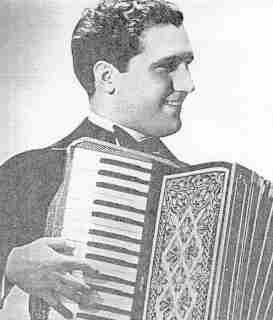When you know of Anthony Galla-Rini's career in the musical and theatrical
world extending over a period of twenty-six years, during which he has
gained an international reputation as an accordion artist, established a
chain of schools on the West Coast, and composed and arranged accordion
music that is played all over the world -- it is amazing to realize that
today he is a charming young man, who has just celebrated his
thirty-second birthday! This is, of course, explained by the fact that
Galla-Rini's musical education began when he was four -- and he made his
professional debut two years later.
Galla-Rini was born into a musical family. Music was his father's
absorbing interest in life, and his profession. To each of his children
he imparted a love of music and gave them the benefit of his own knowledge
and appreciation. He was a pianist, violinist and accordionist. The
Accordion -- a chromatic type -- was the instrument on which the young
Anthony's education was begun.
Having started his son on his studies, the senior Galla-Rini, with his two
daughters, went on tour. Shortly thereafter Anthony -- six years old -- was
summoned to join the act in Cheyenne, Wyoming. A real little trouper, he
made the long journey from his home in San Francisco entirely alone,
taking excellent care of his accordion en route.
At that time Anthony knew but one piece perfectly. It was "Waiting for
The Robert E. Lee," a hit tune of that day. The Galla-Rini act ended up
with father, daughters, and son all playing this catchy melody on their
accordions. Then, one by one, the others quietly left the stage, leaving
little Anthony to finish it alone. This proved a great hit. Anthony
became accustomed to the spotlight at an early age indeed.
Along with accordion, the child musician studied the cornet. At first he
was too small to hold the instrument properly and had to support it on the
floor! In his first lesson he learned to play "The Wearing of the Green."
Later in his career, Galla-Rini played the flute, trombone, piccolo,
Saxophone -- in fact, all of the wind instruments. But always the accordion
was by far his favorite instrument.
"As a young child did you ever have to be told to practice?" we asked the
famous musician.
Galla-Rini smiled. "Perhaps in the very beginning I needed a little
urging, but it wasn't long before I was lost, heart and soul, in music.
Sometimes I practiced for eight hours a day, and had to be made to stop
for my meals.
"Incidentally," Galla-Rini continued, "I might say that such prolonged
practicing is not a good idea, for one becomes too tired physically to
derive any real benefit from his work."
Anthony had not been playing the accordion very long when his father
learned about the piano accordion, and promptly changed to the newer style
both for himself and his son.
In those days there were no instructors for this "novel" instrument, and
no lesson books, and for years Galla-Rini's father was the sole source of
his musical education. At the age of fourteen, while in New York for
theatrical engagements he studied harmony and counterpoint with Professor
Van Broekhaven at Carnegie Hall. Not long ago he worked with the noted
conductor of Chamber Symphonic Music, Gaston Usigli, to become
Editor's Note: The article ends here.
Anthony Galla-Rini (b. January 1904) is presently (March 2000) living in
California. Although he doesn't pick up his accordion as much as he used
to, he still conducts, lectures and presents master classes.
The Classical Free-Reed, Inc. staff gratefully
acknowledges volunteer Patrick Kiley, who assisted in the
production of this article, as well as Stanley Darrow and his
comprehensive American Accordion Musicological Society
library.
